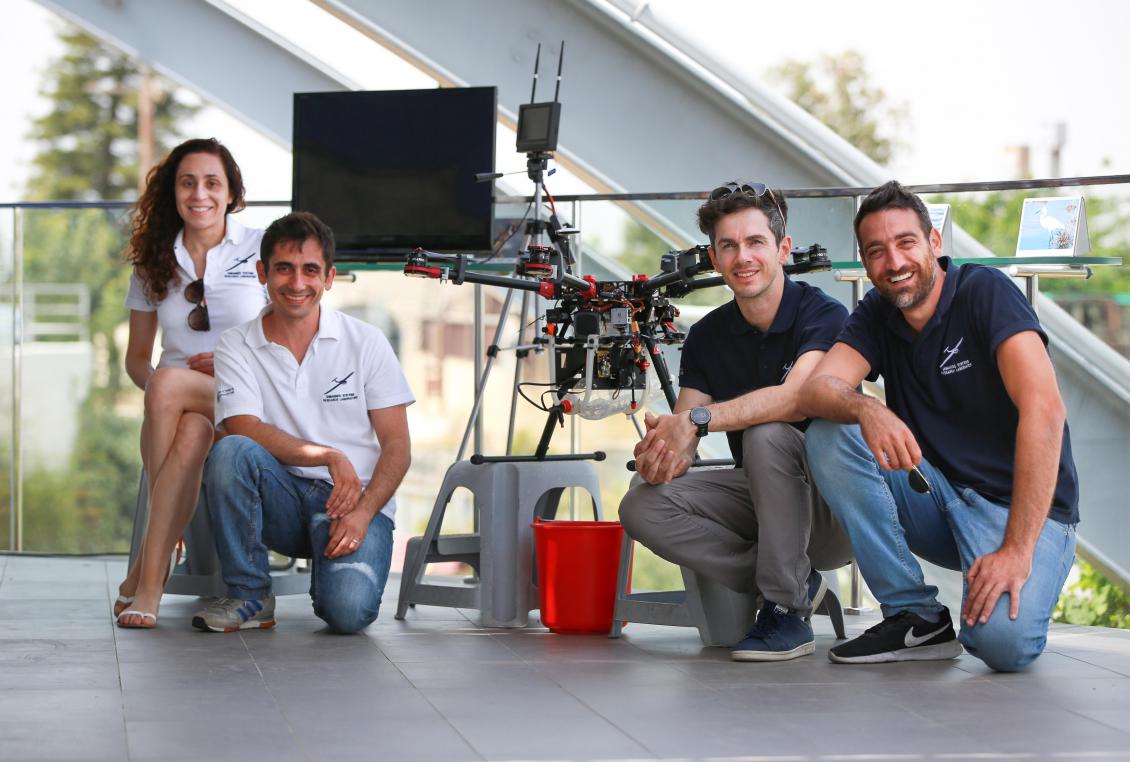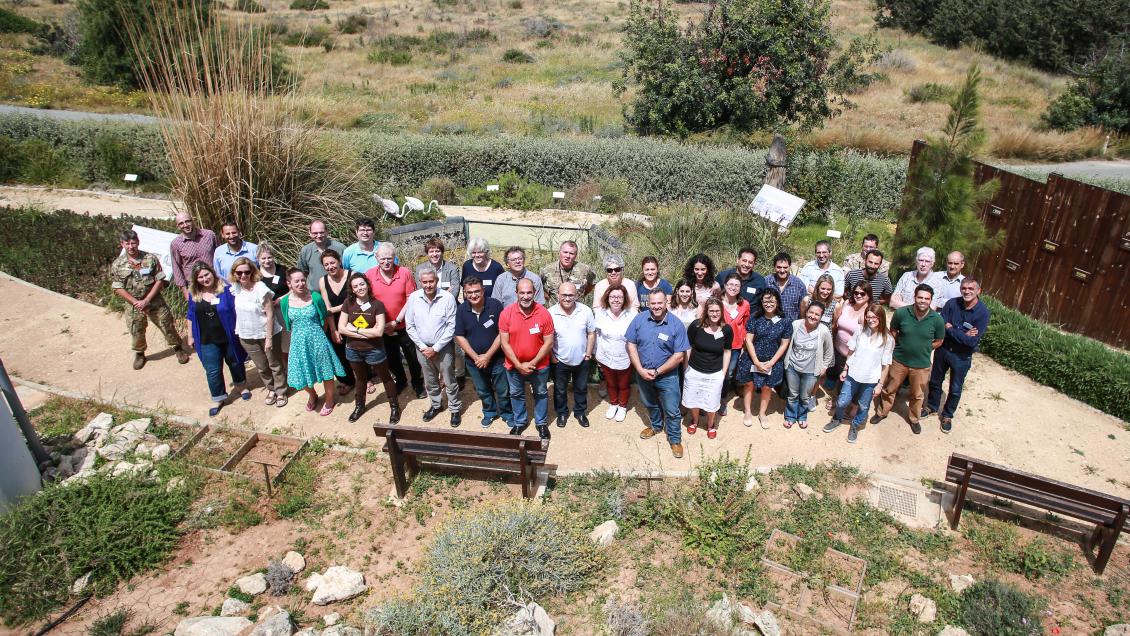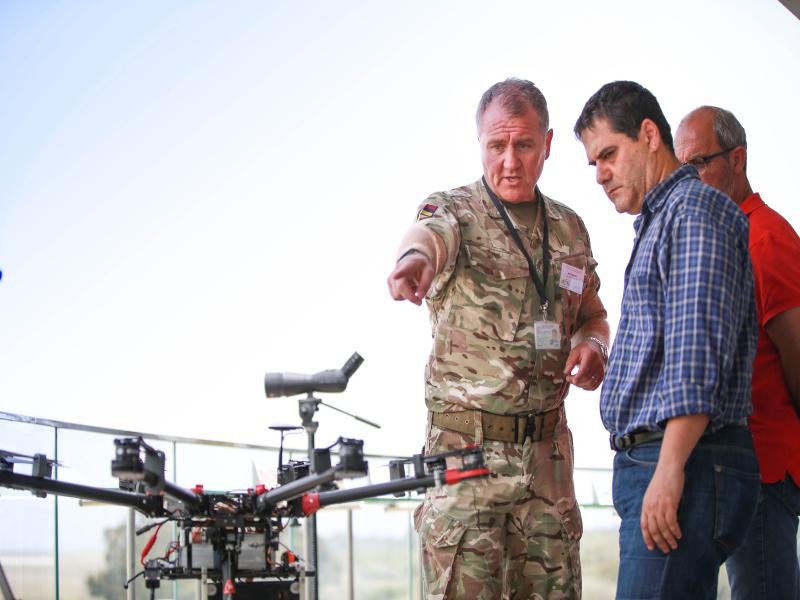Management and Control of Native and Non-Native vectors in the Eastern Mediterranean and the Middle East (EMME) – 18 to 20 Apr 18.
Here we present a selection of interview answers provided by Major James Fawcett MBE, the Officer Commanding the Joint Services Health Unit (JSHU) at RAF Akrotiri in Cyprus to British Forces Media and the Cyprus Free Press. Major Fawcett leads JSHU, an Environmental Health Unit responsible for the surveillance and control of mosquitoes with the Sovereign Base Areas in Cyprus. Cyprus used to be a malaria endemic country and re-emergence of malaria is a concern, so are the invasive mosquito species such as Aedes albopictus (Asian tiger mosquito) and Aedes aegypti (Yellow Fever mosquito) among others who are not yet on island. The meeting was designed to highlight the necessity for the use of sustainable environmental friendly methods for mosquito control especially in vulnerable and special protection areas eg. the Ramsar site of the Akrotiri wetland and at the same time advocate the need for an island wide surveillance scheme for mosquitoes, as mosquitoes have no borders.
JSHU are a partner organisation in the Darwin Project with the Centre of Ecology and Hydrology, UK.
What is the Darwin Project and what was this conference about?
This project started in April 2017 and is a joint venture coordinated between the Joint Service Health Unit (JSHU) at RAF Akrotiri and the UK Centre of Ecology and Hydrology. The first event, in April 2017, was a horizon scanning event focused on the invasive species likely to arrive to Cyprus and the potential threat they pose to biodiversity and human health. This time we were concentrating upon a specific area of interest and importance. For this, the second conference under the Darwin Project banner, we ran the first ever Cyprus conference to discuss the Management of Native and Non-Native Disease vectors in the Eastern Mediterranean and the Middle East (EMME). In total, there were 75 delegates who attended the conference from the 18 to 20 April 2018. The conference was held at the Akrotiri Environmental Education Centre just outside of the RAF Akrotiri Airbase in Cyprus.
Where were the delegates from – organisations, country etc?
We invited a number of international experts on vector management whose specialisations are in the fields of mosquito, sandfly and midges control. The experts came from the UK, France, Spain, Switzerland, Sweden, Greece and Turkey. All of the International delegates are either key note academics or researchers in the field of vector control. Among our excellent invited experts was Dr Francis Schaffner, the Chairman of the European Mosquito Control Agency (EMCA) and the International co-operative Vector Net and also Professor Denis Wright of Imperial College London whose research includes insecticide resistance amongst mosquitoes populations and other insect vectors of disease. We also had representation from the SBA, Army HQ, HQBFC, Limassol and Larnaca District Environmental Health, The Cypriot Ministry of Health, The Cypriot Department of the Environment, The Cypriot Department of Agriculture, The Cyprus University of Technology, The Cyprus Institute, DIO, local landowners and commercial pest control companies.

What was discussed?
The aim of the conference was to provide the basis for international collaboration between the SBA and other parts of the world regarding sustainable mosquito control methods and the potential risk of invasive species arriving on the island (such as A. albopictus). All experts highlighted the need for active surveillance and data management regarding programmes and for the use of sustainable control methods that do not involve the routine use of adulticide insecticidal treatments. All agreed that such treatments should only be undertaken as an extreme measure when public health is threatened directly by vector-borne disease.
This conference will hopefully provide the foundations for further research and development that will allow us to advance our current control programmes without cause long-term ecological damage, prevent insecticidal resistance and prevent invasive species arrival in the Akrotiri Wetlands. It was refreshing to see just how similar if not identical our mosquito control programme in the SBA is to those conducted by Health Departments in Spain, Sweden and Greece. The only thing that differs is the scale of their operations.
The Joint Services Health Unit presented a code of practice for the management of mosquitoes in wetlands and all the experts reached a consensus that as a common European code of practice does not currently exists for wetlands then the JSHU code will be the starting point. The draft document will be presented and peer reviewed by the EMCA later this year.
What was the reaction of those that attended?
The reaction was fantastic. For many this was the first time that they had met in person. One of the delegates stated that; “this is a most welcome widening of my professional family”. Such was the interest and enthusiasm that many of the workshops over ran and we had to re-convene the session in the hotel lobby in the evening!

How useful was it from your perspective?
From my perspective, it was invaluable. It was interesting to see the issues and challenges faced by our international colleagues and just how similar they are to those faced by JSHU. The most common issue being that described as the “silent work” by Dr Ruben Bueno-Mari from Spain. This he used to describe the routine mosquito surveillance, monitoring and application of larvicides that occurs all year in the main breeding sites but is unseen by the public in general and how the public perception is often that nothing is being done. It was also interesting to see how Dr Martina Schafer from Sweden has engaged and educated the public in Sweden about the type and nature of the treatments that they are undertaken. It was also very useful to see, first hand, the new drone “MOZZYJET” that is being tried and tested by the Cyprus Institute in Nicosia as a means of applying an environmental friendly larvicide. We are hoping to trial the drone on the salt marshes later this year.

